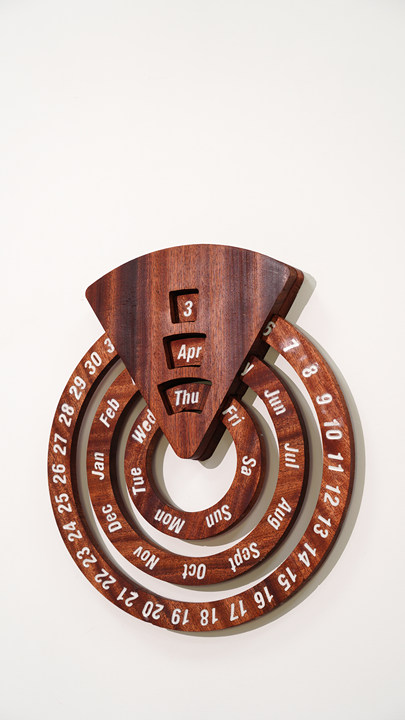If you’re looking for a simple yet artistic CNC woodworking project, this engraved wooden calendar is a great place to start. Using the TwoTrees TTC-H40 CNC Router, you can create a functional desktop calendar that doubles as a piece of furniture art. With its intuitive date module design, this project blends practicality with style—perfect for home offices, studios, or as a handmade gift.
Project Overview
- Project Title: Beginner’s Guide: TTC-H40 Engraved Wooden Calendar – DIY Home Decor
- Type: Home Decor / Artwork / Furniture
- Description: A simple perpetual wooden calendar engraved with the TTC-H40. Combines functionality with artistic beauty, serving as a unique decoration and conversation piece.
CNC Machine & Settings
- CNC Machine: TwoTrees TTC-H40
- Work Area: 1000 × 1000 × 100 mm (39.4 × 39.4 × 4 in)
- Material: Sapele wood
- Cutting Tools: 3.175 mm (⅛″) straight groove end mill
-
Feeds & Speeds (starting point for sapele):
- Cutting feed: 2000 mm/min
- Plunge feed: 1000 mm/min
- Depth per pass: 0.5 mm
Design & Files
- Design Software: Carveco
- File Format: STL
- Customization: Supports logo engraving and text personalization (names, dates, quotes)
Project Difficulty
- Skill Level: Beginner-friendly
- Completion Time: ~1.5 hours
- You’ll Use: Sanding, wood wax/oil finish, simple mechanical assembly
Media Assets
Finished Work Photo:

Video Demo: Watch on YouTube
SEO & Promotion
- Target Keywords: CNC Engraving Machine, CNC Woodworking, Perpetual Calendar, Desktop Calendar, Adjustable Calendar
- Suggested Article Title: Beginner's Guide: TTC-H40 Engraved Wooden Calendar – DIY Home Decor
Conclusion
This DIY engraved wooden calendar is the perfect starter project to explore CNC woodworking. With the TwoTrees TTC-H40, you’ll get precise, repeatable results and a stylish, customizable desk accessory—finished in under two hours.
FAQ
What wood works best for this project?
Sapele engraves cleanly and finishes beautifully. Other great choices: walnut, cherry, maple, or beech. For a budget option, use birch plywood with a veneer or stain.
Which bit should I use for clean lettering and lines?
A 3.175 mm (⅛″) straight or downcut end mill keeps edges crisp in hardwoods. For super-fine text or icons, swap to a 30°–60° V-bit and reduce depth per pass.
What feeds and speeds should I start with?
For sapele: 2000 mm/min, 0.5 mm depth per pass, ~18–22k RPM (if your spindle supports it). If you see tear-out or fuzz, lower the depth per pass or switch to a downcut. For V-carving, use shallower passes (0.2–0.3 mm).
How do I get darker, higher-contrast engravings?
Do a shallow finishing pass, then apply a dark wax, gel stain, or epoxy infill in the engraved areas. Sand back to reveal sharp, high-contrast details.
Can I customize fonts, dates, or add a logo?
Yes. Edit text and icons in Carveco before toolpathing. Use simple, bold fonts for small text to keep legibility after finishing.
How should I hold the workpiece?
Use screws on a spoilboard, low-profile clamps, or double-sided Nitto tape for thin panels. Ensure it’s flat and fully supported to prevent chatter.
Do I need dust collection or an enclosure?
Highly recommended. Hardwood engraving creates fine dust. A shop vac with a dust shoe improves visibility, surface quality, and cleanup.
What finish do you recommend?
For a warm look, use hardwax oil or Danish oil. For maximum protection, use polyurethane (wipe-on for thin, even coats). Always test on a scrap first.
Can the TTC-H40 handle hardwoods?
Yes. With sharp bits and conservative passes, hardwoods like walnut or maple engrave cleanly. Increase depth/feed gradually as your setup allows.




